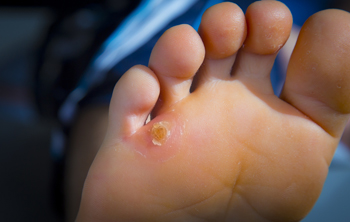
Drexel Hill (484) 521-0233
West Chester (610) 436-5883

Drexel Hill (484) 521-0233
West Chester (610) 436-5883

Excess friction is often the cause of corns developing on the feet. Common places where corns can be found are on the side of the pinky toe, on top of the toes, or on the bottom of the feet. Corns can occur from wearing shoes that do not fit correctly, and relief may be felt when the shoes are removed. The small area of skin that is affected can be rough and yellowed, and can be sensitive when touched. Some patients find their corns feel better when the feet are soaked in warm water, which may help to soften them. Temporary relief can be found when moisturizer is applied to the corn, followed by gently rubbing it with a pumice stone. Additionally, people may find it is beneficial to wear a protective pad over the corns, which may help to protect it from rubbing against the shoe. If you have a corn on your foot, it is suggested that you confer with a podiatrist who can help you with providing a solution for relief.
Corns can make walking very painful and should be treated immediately. If you have questions regarding your feet and ankles, contact the podiatrists of Dr. Siegerman & Associates. Our doctors will treat your foot and ankle needs.
Corns: What Are They? And How Do You Get Rid of Them?
Corns are thickened areas on the skin that can become painful. They are caused by excessive pressure and friction on the skin. Corns press into the deeper layers of the skin and are usually round in shape.
Ways to Prevent Corns
There are many ways to get rid of painful corns such as:
Treating Corns
Although most corns slowly disappear when the friction or pressure stops, this isn’t always the case. Consult with your podiatrist to determine the best treatment option for your case of corns.
If you have any questions please feel free to contact one of our offices located in Drexel Hill and West Chester, PA . We offer the newest diagnostic and treatment technologies for all your foot and ankle needs.
Request a free copy of
Laser Away Foot Pain!
today.
